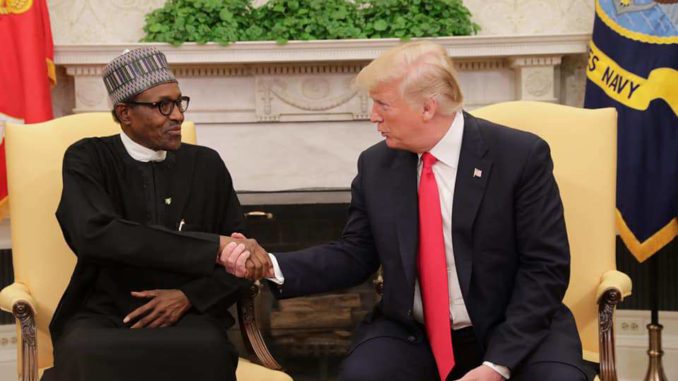
At home, President Muhammadu Buhari seizes every opportunity of his irregular public appearances to harp on Nigeria’s dwindling oil revenues. At some point in 2016, he recalled how crude prices suddenly dived when he assumed office as the head of a military junta in 1980s and wondered why God brought him back at a time of low crude prices again.
In Washington on Monday, the Nigerian leader passed on a major opportunity to confront the matter headlong. The United States remains a major oil importer, despite its recent technological advancements and even oil production output.
On economy
Asked whether he would prevail on his counterpart to buy more of Nigerian sweet crude during a media briefing at the White House’s Rose Garden Monday afternoon, Mr Buhari said he cannot tell another country what to do.
“No, I cannot tell the United States what to do,” the president said. “Luckily for us,” we have other markets for “our crude”.
If the president was trying to be diplomatic, he seemed to have forgotten that diplomacy entails telling another country what to do, albeit in a mellifluous tone. Apparently, the issue with Mr Buhari’s response was not that he couldn’t properly craft his response, it was that he had no response at all.
Consequently, Mr Buhari appeared to have forgotten that crude remains Nigeria’s sole commodity in foreign trade. Also, if there are other markets for Nigerian crude as the president said, then it seems his officials have not received the memo, because news still regularly filters out about complaints of Nigerian crude being stuck at sea.
It was not immediately clear what was served when Mr Buhari dined with Mr Trump ahead of a joint press briefing, but the Nigerian leader acted like a Nigerian in Washington who was overwhelmed by the imposing atmosphere at the White House.
On his part, Mr Trump was hammering on “ripping down the trade barriers’ to enable American goods flood Nigeria. Nigerian market may be comparatively small, but Mr Trump would like to squeeze as much as he could from any country so long as it was in the interest of the United States.
On killings
Also, Mr Buhari was presented with a chance to deliver outright rejection of the narrative that his government was persecuting Christians in the ongoing attacks linked to herdsmen.
Mr Trump specifically said the U.S. condemned “the burning of churches, the killings and persecution of Christians in Nigeria.”
The answer was flipped and lacked gravitas in view of Mr Buhari’s domestic narrative that while the killings might have taken a worrisome dimension since he assumed office, the killers are not buoyed by sheer ethnic identity that they he has in common with them, even if those behind the killings are Fulani.
Mr Buhari should have strongly rejected the claim that Christians are being persecuted on his watch. Yes, he did say the military and other security agencies are working to curb the menace, but he had repeated this time and again and the crisis seems to be exacerbating.
The president, however, spoke of his commitment to human rights and religious freedom, but not in specific response to Mr Trump’s assertion which appeared a red meat to many in his base who have written op-eds accusing Mr Buhari, a Muslim, of complacency in the massacre.
Again, Mr Trump managed to feed his base on this issue. Mr Buhari? Tough call.
Anti-corruption
On the anti-corruption front, Mr Buhari thanked the Trump administration for its support in helping trace up to $500 million. In 2015, Mr Buhari said he was eyeing repatriation of up to $150 billion in Nigerian loot stashed abroad. He should have re-emphasised the figure to Mr Trump for him to appreciate the level of work that still needs to be done in the area of cash and asset recovery.
But it appears that Nigerians are not the only ones not completely blown away by Mr Buhari’s outing today. Already, some African commentators online found Mr Buhari’s answer to the question about Mr Trump’s denigration of black countries off-putting.
“I am very careful what the press says about other persons and myself,” Mr Buhari said and subsequently decided to “keep quiet.”
Still, many are already cutting their losses because Mr Buhari avoided the hoopla that has come to define most of his foreign trips since 2015.
Parting shot
The Nigerian president clearly pulled a surprising one for the last question by displaying a good knowledge of the technology being deployed by the U.S. in the area of shale oil production.
“The progress made by the United States in technology is certainly frightening for our mono economy. I hope technology would allow them use our crude for its quality for petrochemical vis-à-vis” the production of “shale” oil.”
That led to a riff on Mr Trump, who immediately acknowledged Mr Buhari as a terrific visitor.
Mr Buhari spent decades preceding his presidency as a home-based politician, but he since abandoned that feature. He now seems to prefer being surrounded by the diplomatic pleasantries and high-profile dinners, meeting Mr Trump barely a week after he was hosted by Queen Elizabeth II.
Although he hasn’t held a press briefing at home since 2015, the president seemed perfectly at home with the reporters in Washington, indicating that foreign leaders are not the only elements Mr Buhari likes about foreign countries. Still, the press conference ended without a mutual backslapping between the septuagenarian leaders.
END



Be the first to comment